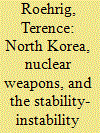| Srl | Item |
| 1 |
ID:
192578


|
|
|
|
|
| Summary/Abstract |
When Vladimir Putin invaded Ukraine last February, he seemed surprisingly confident that threatening nuclear escalation would inhibit any North Atlantic Treaty Organization (NATO) response. Despite Russia’s poor military performance, this coercive nuclear gambit seems to have paid off. Western countries preemptively ruled out direct intervention and have declined Ukraine combat aircraft and longer-range missiles as they openly agonize about how Putin could react if facing an outright military defeat. This seemingly successful use of nuclear brinkmanship raises the specter of the stability-instability paradox, a largely forgotten Cold War theory worrying that stable mutual nuclear deterrence could embolden military adventurism at lower levels of warfare
|
|
|
|
|
|
|
|
|
|
|
|
|
|
|
|
| 2 |
ID:
145480


|
|
|
|
|
| Summary/Abstract |
As the chances wane of North Korea relinquishing its nuclear weapons, how will this capability affect its behavior and tolerance of risk? Increasingly, scholars are using the Cold War concept of a stability-instability paradox to describe the possibility of Pyongyang being more willing to tolerate risk and conduct increased numbers of lower-level provocations under the cover of nuclear weapons. North Korea has long been tolerant of accepting a great deal of risk prior to its acquisition of nuclear weapons, and it is not clear if nuclear weapons have increased that tolerance––or as some have argued, it may actually decrease North Korea’s risk tolerance, making it more cautious. While North Korea’s rhetorical barrages in recent years have exceeded past outbursts, and weapons testing has done a great deal to rattle nerves, much of this can be viewed as part of its deterrence-posturing and less of the more aggressive, status quo-altering actions predicted by the stability-instability paradox.
|
|
|
|
|
|
|
|
|
|
|
|
|
|
|
|